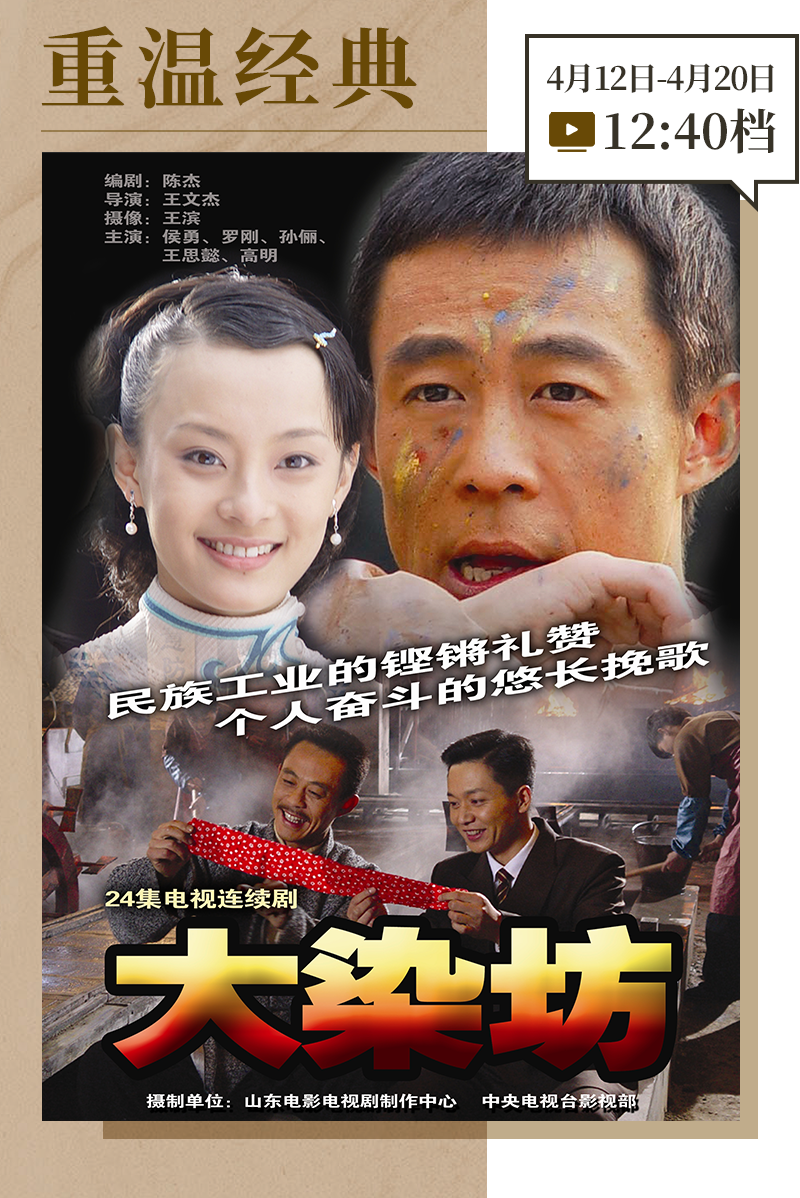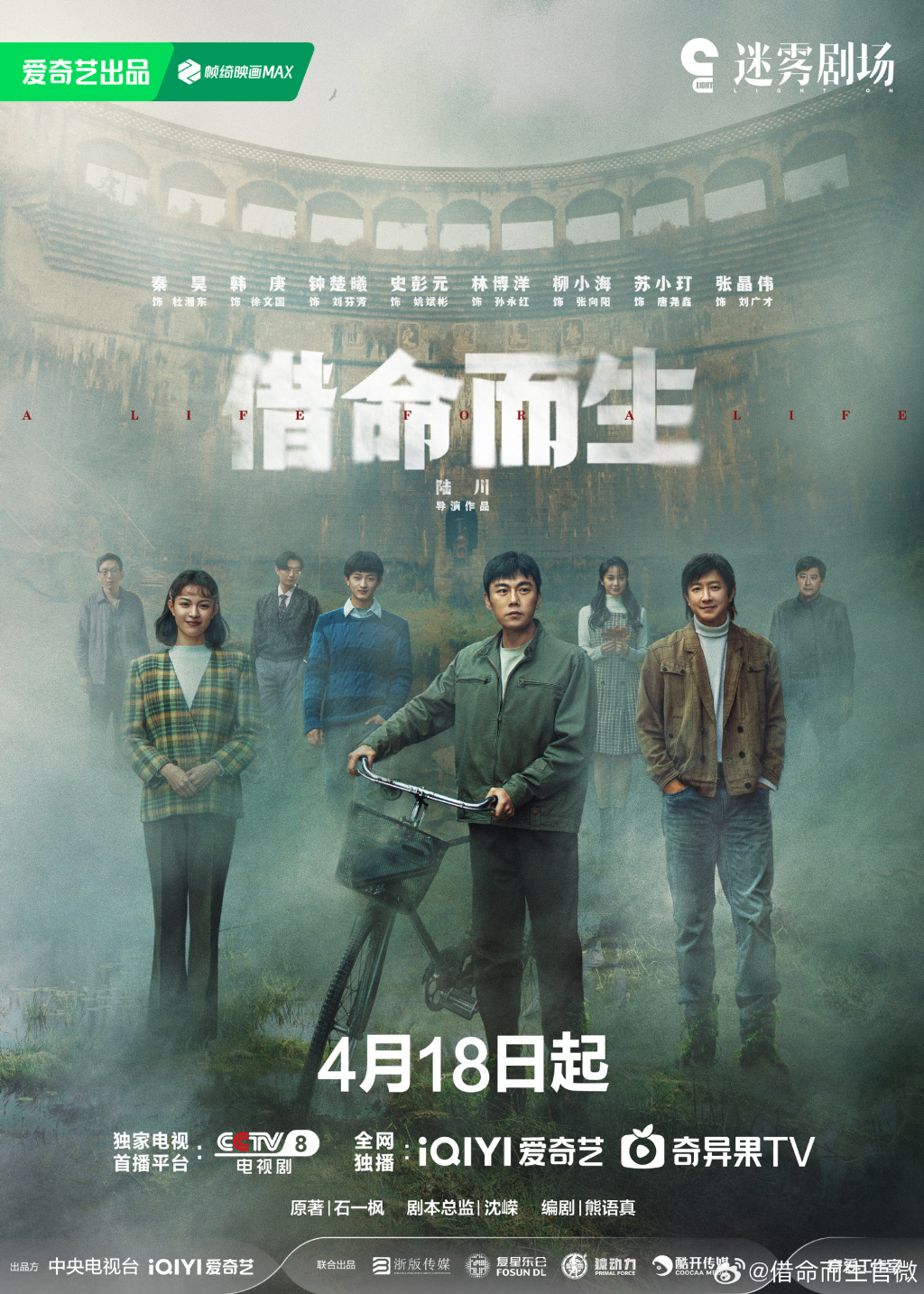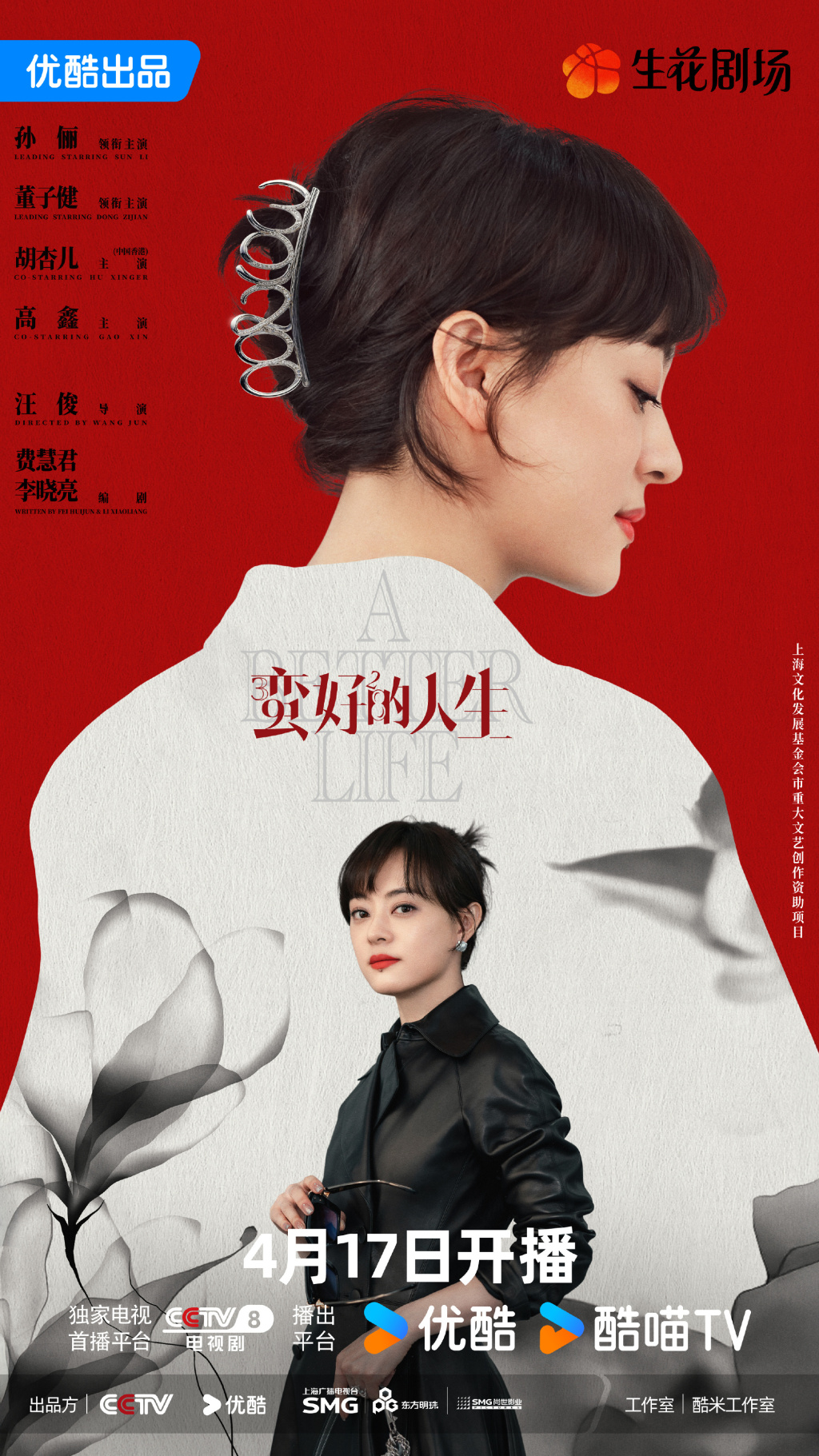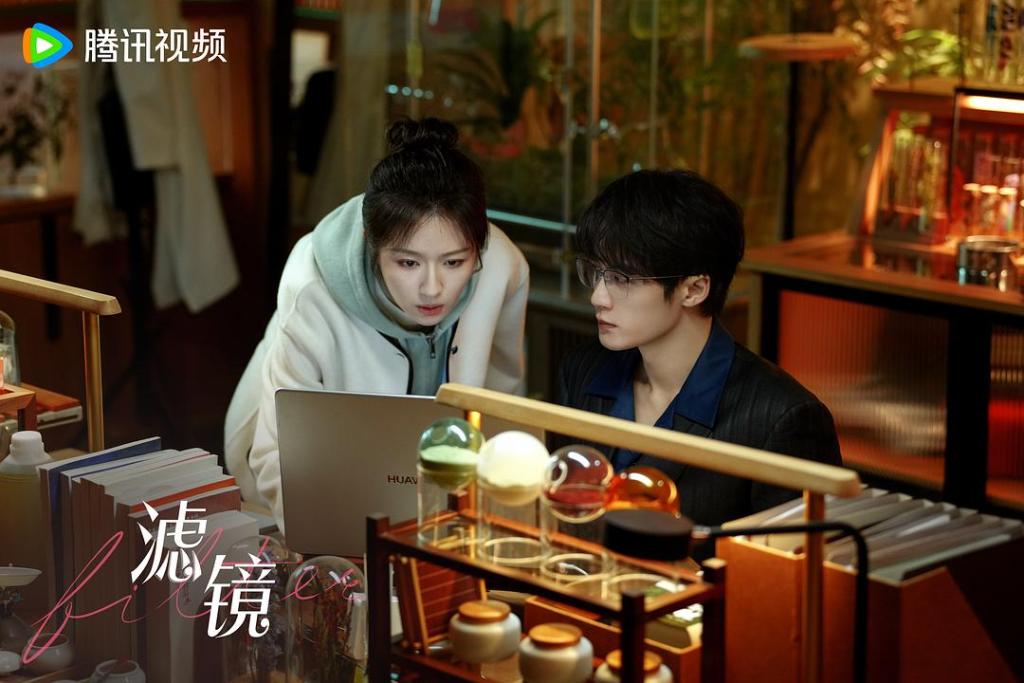

Editor’s Note
The TV series "The Dye House" was directed by Wang Wenjie, written by Chen Jie, and starred by Hou Yong, Luo Gang, Sarina and others. It won the second prize for long-form TV series and the Outstanding Actor Award at the 24th China TV Drama "Flying Apsaras Award".
The drama focuses on the growth and entrepreneurial journey of Chen Shouting, a patriotic industrialist and printing and dyeing giant. It tells the story of how he transformed from an apprentice to a business genius with his tenacious character and extraordinary strategy, how he adhered to national integrity in business wars, and explored the path of China's industrial printing and dyeing in troubled times.
"The Dye House" is currently being broadcast on the "Revisiting Classics" channel. We have specially invited Li Jiuhong, the literary editor of the drama and deputy general manager of Shandong Film and Television Media Group, to reorganize and publish the signed article published in the 11th issue of "China Television" in 2003, interpreting how the drama artistically expresses the orientalization process and nationalization path of "capital" and "industry" through the character of Chen Shouting, showing the true style of the Qilu land in the early twentieth century, and reflecting the ups and downs of China's national industry in the turbulent times.

Stills from the TV series "The Dye House"
The TV series "The Dye House" is a new interpretation of the traditional story of personal struggle and a breakthrough in TV series on national industry. The most touching and successful character in this TV series is the image of Chen Shouting, created by screenwriter Chen Jie, directed by director Wang Wenjie, and portrayed by actor Hou Yong. The whole play describes the growth path and life destiny of a generation of national capitalists, making the image of Chen Shouting a character with unique aesthetic value in the history of Chinese TV series.

Chen Shouting, nicknamed Chen Liuzi, lost his parents early and lived by begging. But he was kind-hearted, intelligent, and ambitious. When he was not begging, he loved to go to the bookstore to listen to storytelling, and was deeply influenced by traditional folk culture. Later, he was taken in by a dyeing and weaving owner in Zhoucun, and from then on he entered the "big dyeing workshop" that marked the development of the national industry at that time.
Chen Shouting experienced the ups and downs of life when he was young, and he invisibly engraved the traditional virtues of China into his growth process. "Heaven is vigorous, and the gentleman is constantly striving for self-improvement; the earth is gentle, and the gentleman is generous and virtuous" is not only Chen Shouting's life motto, but also the highest realm of life pursuit conveyed by this character.

Stills from the TV series "The Dye House"
Chen Shouting also represents the power of modern culture. First of all, he has the character of keeping pace with the times and the vision of development, which are precious spiritual resources of contemporary society. Chen Shouting upgraded the hand-made printing and dyeing technology to machine printing and dyeing, and then developed it to printing technology. He walked out of the remote Zhoucun and walked into the big city, dreaming of conquering the prosperous Shanghai with strength and even developing the enterprise to the whole world. The courage, vision and spirit shown by Chen Shouting in the process of entrepreneurship are consistent with the character of keeping pace with the times and the vision of development advocated by contemporary society, which has an enlightening and guiding role in the real society.
Secondly, the concept of attaching importance to science and technology and talents makes Chen Shouting shine with the light of modern consciousness. He has repeatedly emphasized that without the trust and confidence of Mr. Lu, Mr. Lin and others, he would not have the motivation to devote himself to his career and the space to display his experience. This reveals the principle of Bo Le recognizing a good horse. Chen Shouting's behavior of taking good care of technical workers highlights the concept of respecting talents in folk culture.

Stills from the TV series "The Dye House"

Chen Shouting's legendary experience emphasizes that people's economic quality needs to be combined with moral quality. Chen Shouting did not use strict hierarchy to determine the ethical status of his parents. He was tolerant and generous in dealing with the hostility of Lu Jiaju, Sun Mingzu, and Lin Xiangrong. He would also return the appreciation of his partners, Mr. Lu and Mr. Lin. He was able to build half of the printing and dyeing industry step by step, which was partly due to his healthy personality without any dark psychology. In fact, this healthy personality was realized in the first episode when he was a beggar, through his dream of flying snow and singing "Red Mane Fiery Horse".
Chen Shouting had no political power, but relying on the depth and breadth of his humanity, he became a personality image similar to a "living Bodhisattva" in Chinese folk culture and literature. When he showed tolerance, forgiveness and sympathy, it also meant that the character was psychologically strong and mature.
It can be seen that "The Dye House" fully reflects the influence of the traditional culture of the Chinese nation on people's behavior and thinking habits. Therefore, the whole play has a profound national cultural heritage and ensures the inheritance of the traditional virtues of the Chinese nation in contemporary society.

Stills from the TV series "The Dye House"

The story of "The Dye House" takes place in an era of collision between old and new ideas and between Chinese and Western cultures. Against this broad historical background, Chen Shouting used his personal struggle to compose a song of sorrow and joy for China's national industry. Of course, what is most shocking is that he used his own actions to show the song of self-improvement of ordinary Chinese people, reflecting the simple national spirit shown by a generation of national capitalists in the struggle to realize the dream of a strong country. He has excellent organizational skills, business capabilities, and a sense of practical benefits. He captures all business opportunities with his shrewd insight. With his strong physique and unyielding spirit, he grew from a beggar to a genius in the printing and dyeing industry who shook the north and south amid the oppression of the great powers.

Stills from the TV series "The Dye House"
The image of Chen Shouting also implements the creator's aesthetic imagination of national wisdom. His unique tactics of applying folk wisdom to business wars are the highlights of the play. In his struggle, every problem he encountered seemed insurmountable, but every solution was unexpected but reasonable. For example, Chen Shouting provided gray cloth for the Eighth Route Army, but was afraid that the gray cloth could not be transported out of Jinan, so he used his dyeing and weaving knowledge to add a kind of adjustment when dyeing the cloth, so that the cloth could be restored to gray as long as it was washed.

Stills from the TV series "The Dye House"

Chen Shouting's tragic ending reflects a kind of national integrity that would rather die than live in disgrace. Although the whole play puts the grand historical background and political struggle after the story and brings the fate of the characters to the foreground, Chen Shouting used his wisdom and strength to participate in major historical events such as the May Fourth Movement, the September 18th Incident, and the outbreak of the Anti-Japanese War: in Qingdao, he took out 40 feet of Flying Tiger brand cloth to support the student march, took in a large number of refugee workers and provided them with pensions after the fall of Northeast China, and launched a battle of wits to eliminate the traitor dyeing factory regardless of personal interests. In the end, Han Fuju abandoned the city and fled, and Chen Shouting died of extreme grief and anger at the birthday party. This scene is the climax of the whole play and the finishing touch. This stroke completes the sublimation of the protagonist's national integrity. So far, Chen Shouting has completed his upright and upright personality with his life. It can be said that "Isn't it a heavy responsibility to take benevolence as one's own responsibility? Isn't it a long way to go until death?"

Stills from the TV series "The Dye House"
At the same time, "The Dye House" is an all-round introduction to Qilu culture through the description of Chen Shouting's living background and material environment. It is the first time that it has positively demonstrated the role of Qilu culture in the development of China's national industry in the early 20th century, reflecting the brilliance of Qilu folk culture and folk wisdom. The folk customs that appear in large numbers in the play are not simple labels, but cultural creation and display based on a deep understanding of Qilu culture.

Stills from the TV series "The Dye House"
Through the personal struggle of Chen Shouting, The Dye House describes the development of China's national industry in the early 20th century, and uses a historical perspective to see through the disillusionment of a generation's dream of a strong country, and keenly captures the inextricable connection between the contemporary propositions of national salvation and enlightenment, anti-imperialism and patriotism, and the development of national industry. Through the image of this character, the orientalization process and nationalization path of "capital" and "industry" are artistically expressed, as well as the fateful thinking of the trinity of "individual, family, and country".
(The original article "Difficult Journey - A Brief Analysis of the Character Image of Chen Shouting, the Protagonist of the TV Series "The Dye House"" was published in "China Television" No. 11, 2003. The author Li Jiuhong is the deputy general manager of Shandong Film and Television Media Group and a first-class screenwriter. He is one of the first batch of contracted literary critics in Shandong Province, a young and middle-aged expert with outstanding contributions in Shandong Province, and an expert enjoying special allowances from the State Council. He is a visiting scholar at the University of California, Berkeley. He also serves as the vice chairman of the Shandong Federation of Literary and Art Circles and the chairman of the Shandong Film Association.)
Editor of this article: Zhao Cong and Mao Yi
- xnHLzWdxei04/17/2025
- xnHLzWdxei04/17/2025
- yKJGSuywfHvs04/17/2025


